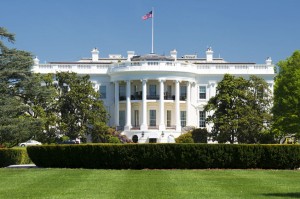Looking Forward to a President Without God

Imagine the oath when the United States’ first atheist president is inaugurated:
I do solemnly swear that I will faithfully execute the Office of President of the United States, and will to the best of my ability, preserve, protect and defend the Constitution of the United States, so help me Darwin.
OK, so the “so help me…” part of the Presidential Oath isn’t actually required, and I can hardly imagine a day anytime soon when references to God would be replaced by those to Charles Darwin. But could you imagine an openly atheist president taking the oath of office while placing his or her hand on The Origin of Species instead of the Bible? Or, at the very least, the US Constitution—the very document that an incoming president is swearing to preserve, protect, and defend?
Two US presidents, Theodore Roosevelt and John Quincy Adams, chose not to place their hand on a Bible when being sworn in. It’s unknown why Roosevelt refused to take the oath on the Bible, but according to a 2013 CNN piece by lawyer turned political comedian Dean Obeidallah, “Adams chose to be sworn in with his hand on a book of US laws. He wanted to demonstrate that he recognized a barrier between church and state and that his loyalty was to our nation’s laws above all else.” (Kentucky Clerk Kim Davis could learn a thing or two from Adams.)
I imagine that many nonbelievers doubt the likelihood of seeing an atheist president in their lifetime—perhaps in a similar way to how many African Americans pre-2008 doubted seeing a black president in their lifetimes. But how far are we actually from having an atheist president?
Since 1937, a Gallup poll has asked respondents whether or not they would vote for an atheist for president, and atheists have consistently been at the bottom of the list of ideological identities for which respondents would vote. But Mormonism is not too far from atheism on the list, and it happened to be the religion of 2012 GOP nominee Mitt Romney.
In the 2012 survey by Gallup, 80 percent of Americans said they would vote for a Mormon for president, and 47 percent of the electorate voted for Mitt Romney in the general election. In the same survey, 54 percent said they would vote for an atheist. In any case, there was no indication (except some media speculation) that Mitt Romney’s religion cost him the election. (It’s more likely his leaked comment that 47 percent of people in the country would automatically vote for Barack Obama because they had their hands out waiting for the government’s help cost Romney the election.)
Anyway, there’s more encouraging news for atheists. In the most recent study released by Gallup this year, atheists are no longer at the bottom of the list of who gets votes. In turns out Americans distrust socialists more. But what does it say about these surveys when a well-known socialist (and, more than likely, a closeted atheist) like Bernie Sanders is giving the Democratic frontrunner Hillary Clinton more of a run than she expected in these early days of the 2016 presidential race?
In all seriousness, these recent polls along with those showing that roughly one-in-five people in this country identify as nonreligious are relevant when thinking about an openly atheist president. The United States is clearly becoming less religious, but more importantly, these studies show that as more and more Americans are choosing to live openly without religion, those who are religious are also becoming more accepting of the nonreligious in the general public as well as in the political world. That is what’s really important in terms of growing the trust needed to elect an atheist president.
So what might an atheist (or humanist) president do on the first day in the Oval Office? Make Darwin Day a federal holiday and do away with the National Day of Prayer? Disband the Congressional Prayer Caucus in the House of Representatives, or maybe call for the removal of “In God We Trust” on our currency and on government buildings? OK, an atheist president probably wouldn’t pursue these issues on the first day or even in their first term, but they might as a lame duck if they were bold enough.
The fact is that an atheist president wouldn’t act all that differently than previous presidents. US presidents are obviously limited in what they can do by Congress. And secondly, the United States will likely still be a majority religious country when a nonbeliever takes office. There seems to be this belief that in order to elect an atheist, America needs to not be religious at all or at least the “nones” have to be a majority. I don’t believe that’s true.
When we finally elect an atheist as president, he or she will have the same responsibility to represent religious Americans as a religious president has to represent atheists. Yes, they could be the first to take an oath on the US Constitution, which will be great to see. But more importantly, an atheist president will finally honor that oath to preserve and protect the Constitution, starting with the First Amendment’s principle of a separation between church and state.
